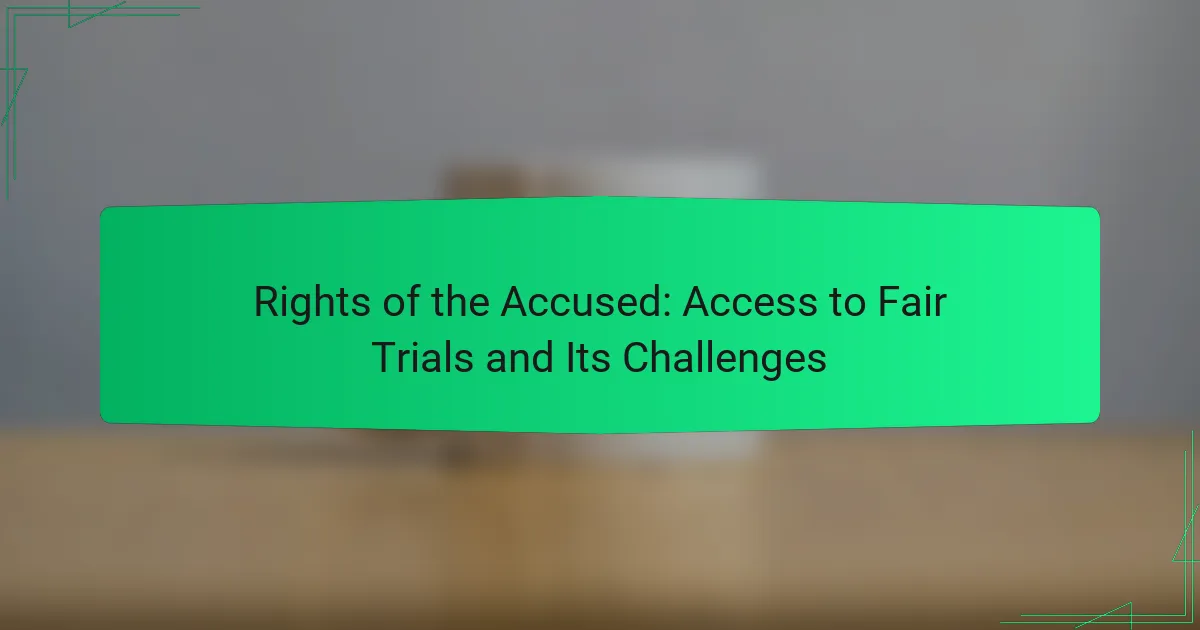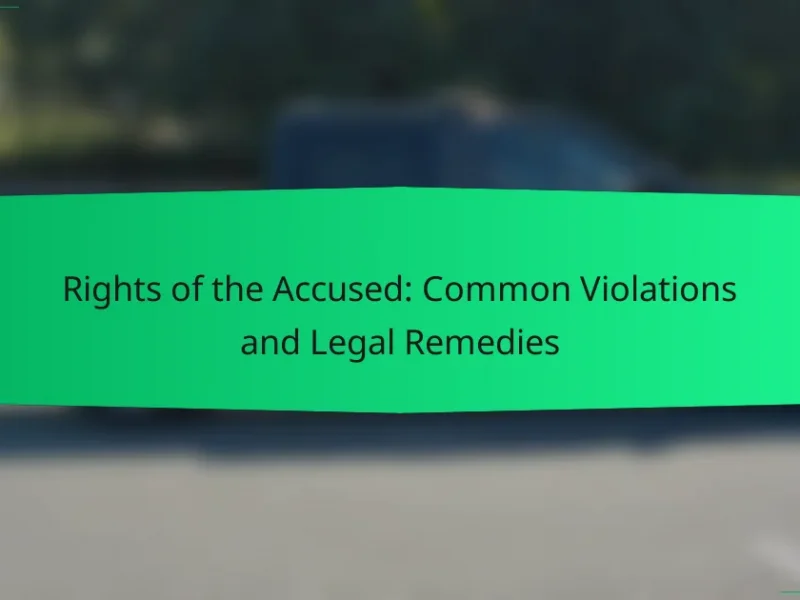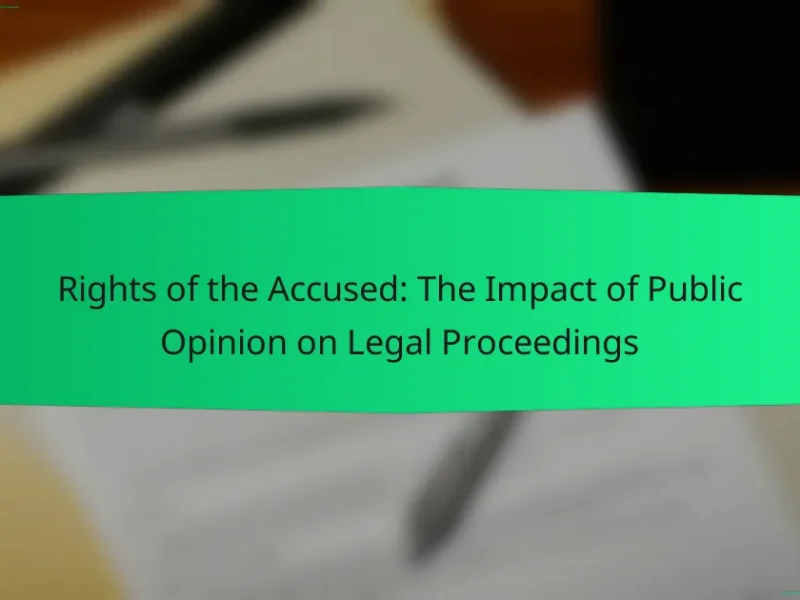The rights of the accused are fundamental legal protections that include the presumption of innocence, the right to a fair trial, and the right to legal representation. These rights are crucial in ensuring justice and preventing wrongful convictions, and they are enshrined in various legal systems worldwide, such as the Sixth Amendment in the United States and the Human Rights Act in the United Kingdom. Different jurisdictions exhibit diverse approaches to these rights, reflecting their unique legal traditions and cultural values. The article will explore current trends impacting the rights of the accused, including the integration of technology in legal processes, the rise of restorative justice practices, and the influence of social media on public perception and trial proceedings. Additionally, it will examine how international human rights standards are shaping national legal frameworks regarding fair trials.
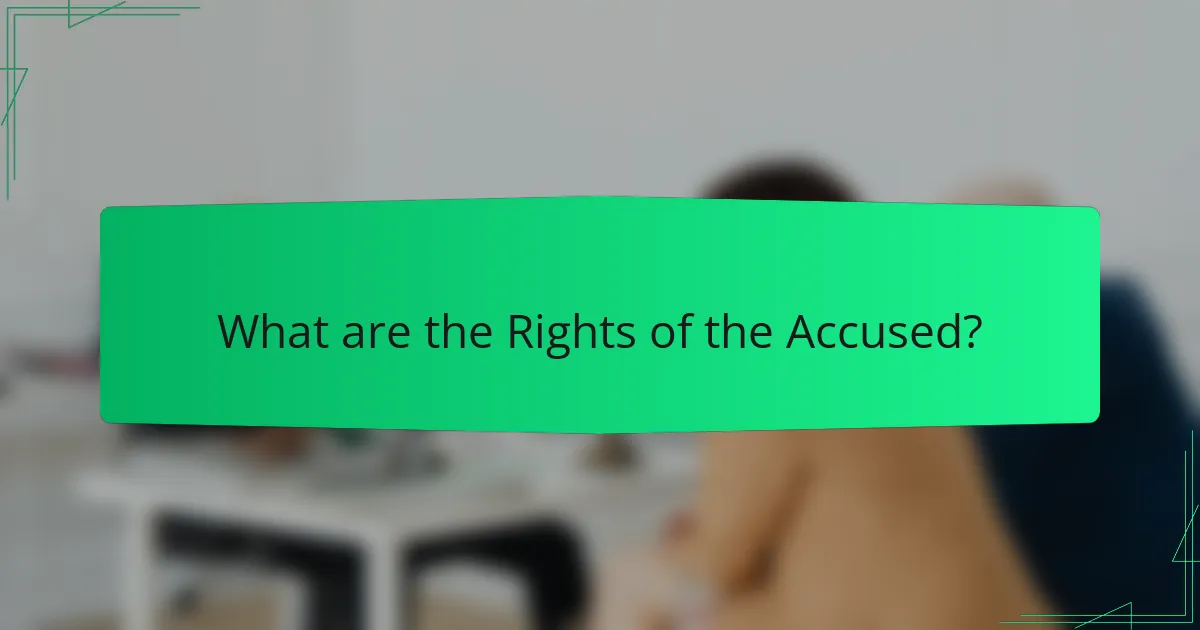
What are the Rights of the Accused?
The rights of the accused include the presumption of innocence, the right to a fair trial, and the right to legal representation. The presumption of innocence means that the accused is considered innocent until proven guilty. The right to a fair trial ensures that the accused has a chance to defend themselves in an impartial setting. Legal representation allows the accused to have a lawyer present during proceedings. Additional rights include the right to remain silent and protection against self-incrimination. These rights are established to uphold justice and protect individuals from wrongful convictions. They are enshrined in various legal systems, including the Sixth Amendment of the U.S. Constitution.
Why are Fair Trials Essential for the Accused?
Fair trials are essential for the accused to ensure justice and uphold legal rights. They provide the accused with an opportunity to present their case in an impartial setting. This process helps prevent wrongful convictions. According to the Sixth Amendment of the U.S. Constitution, the accused have the right to a fair trial. This right is fundamental in maintaining public confidence in the legal system. Fair trials also protect against arbitrary punishment. They ensure that evidence is examined fairly and that the accused can challenge the prosecution’s claims. Overall, fair trials are crucial for safeguarding individual liberties and promoting accountability within the justice system.
What constitutes a fair trial?
A fair trial constitutes a legal proceeding that ensures justice is administered impartially. Key elements include the right to legal representation, the presumption of innocence, and an unbiased judge or jury. Transparency in the legal process is vital, allowing public access to proceedings. The accused must have the opportunity to present evidence and confront witnesses. Timeliness is also essential, as delays can undermine justice. These principles are enshrined in international law, such as the Universal Declaration of Human Rights. Article 10 states that everyone is entitled to a fair and public hearing. This legal framework supports the notion that fairness is crucial for legitimate judicial outcomes.
How do fair trials protect the rights of the accused?
Fair trials protect the rights of the accused by ensuring due process and impartiality. Due process guarantees that the accused receives a fair hearing. This includes the right to legal representation. Legal representation helps the accused navigate the complexities of the legal system. Impartiality ensures that judges and juries are unbiased. An unbiased tribunal is essential for a fair verdict. Additionally, fair trials provide the accused the opportunity to present evidence. This opportunity allows the accused to defend themselves effectively. The presumption of innocence is also a fundamental principle. This principle means the accused is considered innocent until proven guilty. Collectively, these elements safeguard the rights of the accused in the judicial process.
What Legal Framework Supports the Rights of the Accused?
The legal framework that supports the rights of the accused includes constitutional provisions, international treaties, and statutory laws. In the United States, the Sixth Amendment guarantees the right to a fair trial, legal counsel, and an impartial jury. Additionally, the Fourteenth Amendment ensures due process rights. Internationally, the Universal Declaration of Human Rights and the International Covenant on Civil and Political Rights emphasize fair trial rights. These documents establish standards that protect individuals against wrongful prosecution and ensure their rights are upheld throughout legal proceedings.
What are the key international laws regarding fair trials?
Key international laws regarding fair trials include the International Covenant on Civil and Political Rights (ICCPR) and the Universal Declaration of Human Rights (UDHR). The ICCPR, adopted in 1966, emphasizes the right to a fair trial in Article 14. It mandates that everyone is entitled to a public hearing by a competent, independent, and impartial tribunal. The UDHR, established in 1948, asserts in Article 10 that everyone is entitled to a fair and public hearing. Additionally, the Convention Against Torture and Other Cruel, Inhuman or Degrading Treatment or Punishment reinforces the importance of fair trials by prohibiting evidence obtained through torture. These laws collectively establish a framework for ensuring justice and protecting the rights of the accused globally.
How do national laws ensure the rights of the accused?
National laws ensure the rights of the accused through various legal protections. These protections include the right to a fair trial, legal representation, and the presumption of innocence. The Sixth Amendment in the U.S. Constitution guarantees the right to counsel. Many countries have similar provisions in their legal systems. Laws also require that the accused be informed of the charges against them. This allows for adequate preparation of a defense. Additionally, national laws often mandate that trials be conducted in a timely manner. This prevents undue delay in the legal process. Courts are required to follow these legal standards to uphold the rights of the accused.
What Challenges Do Accused Individuals Face in Accessing Fair Trials?
Accused individuals face significant challenges in accessing fair trials. These challenges include limited access to legal representation. In many cases, individuals cannot afford a lawyer. This lack of representation can lead to inadequate defense during trial proceedings. Additionally, systemic biases may affect the impartiality of the judicial process. Factors such as race, socioeconomic status, and public opinion can influence trial outcomes. Furthermore, accused individuals often encounter difficulties in gathering evidence to support their defense. The complexity of legal procedures can also hinder their ability to navigate the system effectively. According to a report by the American Bar Association, inadequate legal resources disproportionately impact marginalized communities. These systemic issues contribute to a lack of fair trial access for many accused individuals.
What are common barriers to fair trial access?
Common barriers to fair trial access include financial constraints, lack of legal representation, and language barriers. Financial constraints often prevent individuals from affording legal counsel. According to a report by the American Bar Association, over 80% of low-income individuals do not receive adequate legal assistance. Lack of legal representation can lead to unprepared defendants in court. Language barriers hinder non-native speakers from understanding proceedings, affecting their ability to defend themselves. Additionally, geographic isolation can limit access to courts and legal resources. These factors collectively undermine the right to a fair trial.
How do socioeconomic factors impact the rights of the accused?
Socioeconomic factors significantly impact the rights of the accused. Individuals from lower socioeconomic backgrounds often face disadvantages in accessing legal representation. This can lead to inadequate defense during trials. Research indicates that public defenders are often overburdened and under-resourced. Consequently, their clients may receive less effective legal support. Additionally, socioeconomic status can influence perceptions of guilt. Jurors may hold biases against those from poorer backgrounds. These biases can affect trial outcomes and sentencing. Overall, socioeconomic factors create disparities in the justice system that can undermine the rights of the accused.
How Can the Rights of the Accused Be Improved?
The rights of the accused can be improved by ensuring better access to legal representation. Studies indicate that defendants with legal counsel are more likely to receive fair trials. Increasing funding for public defender programs can help achieve this goal. Additionally, implementing stricter guidelines for police conduct during arrests can protect the rights of the accused. Training law enforcement on the importance of these rights can reduce violations. Expanding access to pre-trial services can also support the accused in navigating the legal system. Finally, enhancing public awareness about the rights of the accused can empower individuals to advocate for themselves.
What reforms are necessary for better access to fair trials?
Reforms necessary for better access to fair trials include improving legal representation and ensuring adequate funding for public defenders. Many defendants lack quality legal counsel due to financial constraints. Expanding eligibility for legal aid can help address this issue. Additionally, reforms should focus on simplifying court procedures to make them more accessible. Complex legal jargon often confuses defendants and impedes their understanding of the process. Implementing technology, such as online filing systems, can streamline access to court documents. Increasing transparency in the judicial process is also crucial. Public access to court proceedings and records fosters accountability and trust. Furthermore, training judges and court staff on bias reduction can enhance fairness in trials. These reforms collectively aim to create a more equitable legal system.
How can legal representation be enhanced for the accused?
Legal representation for the accused can be enhanced through increased funding for public defenders. Adequate resources allow public defenders to spend more time on cases. This leads to better case preparation and stronger defenses. Training programs can also improve the skills of legal representatives. Specialized training in areas like mental health or substance abuse can benefit defendants. Access to expert witnesses can further strengthen a defense. Collaboration with social services can address underlying issues affecting the accused. Overall, these enhancements contribute to fairer trial outcomes.
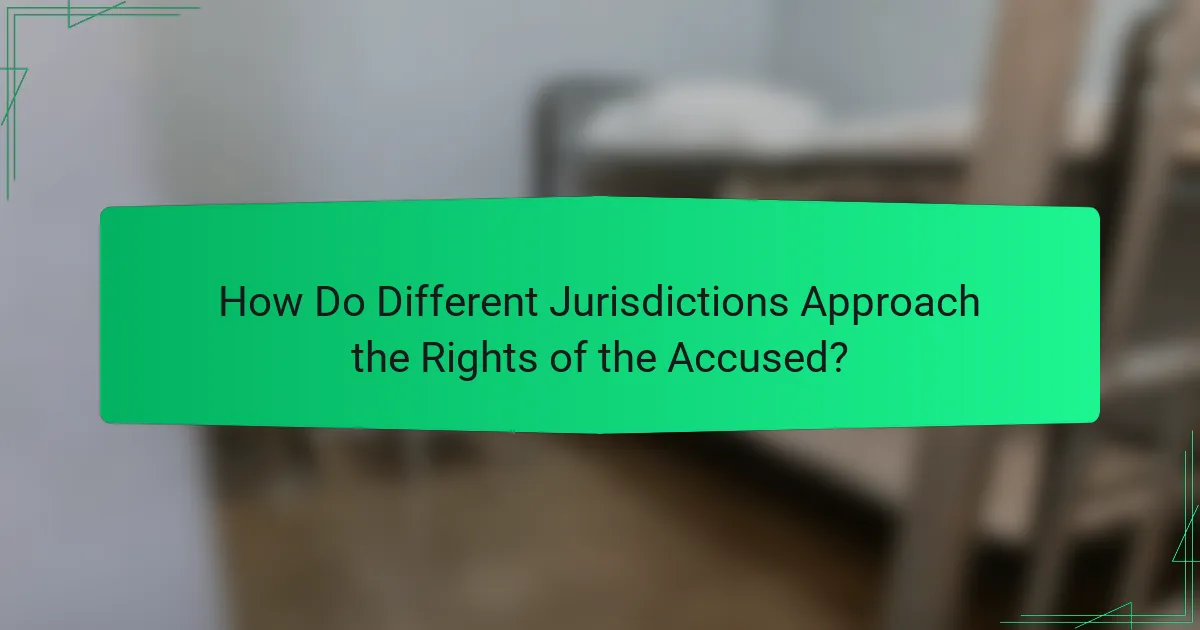
How Do Different Jurisdictions Approach the Rights of the Accused?
Different jurisdictions approach the rights of the accused through varying legal frameworks and protections. In the United States, the Sixth Amendment guarantees the right to a fair trial, legal counsel, and an impartial jury. In contrast, the United Kingdom emphasizes the presumption of innocence and the right to a fair trial under the Human Rights Act 1998. Countries in the European Union follow the Charter of Fundamental Rights, which includes specific rights for the accused, such as access to legal assistance and the right to remain silent. In some jurisdictions, such as China, the rights of the accused are more limited, with a focus on state security over individual rights. Each jurisdiction’s approach reflects its legal traditions, cultural values, and historical context.
What are the variations in fair trial rights across countries?
Fair trial rights vary significantly across countries. In some nations, these rights are enshrined in constitutions, ensuring legal representation and impartial judges. For example, the United States guarantees the right to counsel and a speedy trial under the Sixth Amendment. Conversely, in countries with less robust legal frameworks, such as North Korea, fair trial rights are severely limited or non-existent. In many European countries, such as Germany and France, defendants enjoy extensive rights, including the presumption of innocence and the right to appeal. However, in some developing nations, systemic issues like corruption and lack of resources hinder the implementation of fair trial standards. International treaties, like the International Covenant on Civil and Political Rights, set minimum fair trial standards, but adherence varies widely.
How do common law and civil law systems differ in their treatment of the accused?
Common law and civil law systems differ significantly in their treatment of the accused. In common law systems, the accused enjoys a presumption of innocence and the burden of proof lies with the prosecution. This means the prosecution must prove guilt beyond a reasonable doubt. Additionally, common law systems often allow for more adversarial proceedings, where the accused can confront witnesses and present a defense actively.
In contrast, civil law systems operate on a more inquisitorial model. Here, judges play a central role in investigating the case. The accused still has rights, such as the presumption of innocence, but the process can be less adversarial. The judge may question the accused and witnesses directly, which can lead to a different dynamic in the courtroom.
Moreover, civil law systems may have stricter rules regarding pre-trial detention and the rights of the accused during investigations. For example, in some civil law jurisdictions, the accused may be held without charge for longer periods compared to common law systems.
These fundamental differences reflect the underlying philosophies of each legal tradition, influencing how justice is administered and perceived.
What lessons can be learned from international best practices?
International best practices in fair trials highlight the importance of transparency and accountability. These practices emphasize the need for an independent judiciary. They also show that legal representation is crucial for the accused. Access to legal aid improves trial fairness significantly. Countries with robust legal frameworks often see lower rates of wrongful convictions. Best practices include timely access to evidence for the defense. Training for legal professionals enhances the quality of representation. Lastly, public awareness of rights contributes to a more informed society.
How Does Public Perception Affect the Rights of the Accused?
Public perception significantly influences the rights of the accused. When the public views an accused individual negatively, it can lead to pressure on the legal system. This pressure may result in biased media coverage and public outcry for harsher penalties. Such dynamics can compromise the fairness of trials.
For instance, high-profile cases often see jurors influenced by media portrayals. A study by the American Bar Association highlights that pre-trial publicity can sway jury decisions. This undermines the principle of a fair trial, as jurors may not remain impartial.
Additionally, public sentiment can lead to legislative changes that restrict the rights of the accused. Laws may be enacted in response to public demand for tougher crime measures. Overall, public perception shapes the legal landscape, impacting the fundamental rights of individuals facing charges.
What role does media play in shaping views on the accused?
Media plays a significant role in shaping views on the accused. It influences public perception through coverage of legal cases. Sensationalized reporting can lead to bias against the accused. For instance, headlines often emphasize guilt before a trial concludes. This creates a presumption of innocence erosion. Studies show that media framing affects juror decisions. A 2018 study in the Journal of Criminal Justice found that negative portrayals in media can lead to harsher sentencing. Furthermore, social media amplifies narratives, often spreading misinformation. This immediacy can skew public opinion rapidly. Overall, media’s portrayal of the accused can impact their right to a fair trial.
How can public awareness campaigns improve understanding of fair trial rights?
Public awareness campaigns can significantly enhance understanding of fair trial rights. These campaigns educate the public about legal processes and individual rights. They provide accessible information through various media platforms. This information helps demystify complex legal concepts. Enhanced understanding can lead to increased public advocacy for fair trial protections. Research indicates that informed citizens are more likely to engage in legal reforms. For instance, campaigns have been shown to increase knowledge of rights by over 30% in targeted communities. This knowledge empowers individuals to assert their rights effectively.
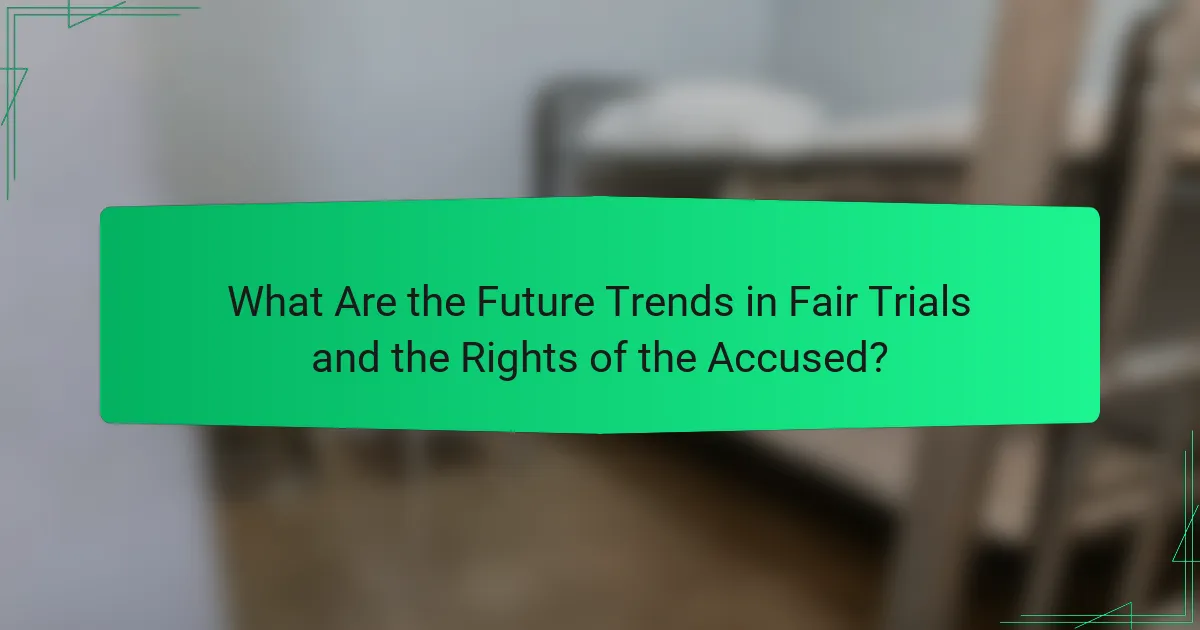
What Are the Future Trends in Fair Trials and the Rights of the Accused?
Future trends in fair trials and the rights of the accused include increased reliance on technology and data analytics. Courts are adopting artificial intelligence to analyze evidence and predict outcomes. This trend aims to enhance efficiency and objectivity in legal proceedings. Additionally, there is a growing emphasis on transparency in judicial processes. Public access to trial information is expected to improve accountability.
Moreover, restorative justice practices are gaining traction. These practices focus on rehabilitation rather than punishment. They aim to involve victims, offenders, and the community in the resolution process. International human rights standards are also influencing national legal systems. Countries are increasingly aligning their laws with global norms regarding fair trials.
Lastly, the impact of social media on public perception is significant. It affects jury selection and trial proceedings. As these trends evolve, they will shape the future landscape of justice for the accused.
How is technology influencing the rights of the accused?
Technology is influencing the rights of the accused by enhancing access to legal resources and information. Digital tools allow for faster communication between defendants and their legal representation. Online databases provide immediate access to case law and legal precedents. Video conferencing technology facilitates remote court appearances, ensuring that defendants can participate in hearings. Additionally, data analytics can identify patterns in judicial decisions, promoting transparency in the legal process. However, technology also poses challenges, such as potential biases in algorithmic decision-making. These developments in technology are reshaping the landscape of legal rights for the accused.
What are the implications of digital evidence on fair trials?
Digital evidence significantly impacts fair trials by influencing the admissibility of information and the integrity of the judicial process. It can enhance the accuracy of evidence presented in court. Digital evidence includes data from devices, social media, and communications. This type of evidence can be easily manipulated or misinterpreted, raising concerns about reliability. Courts must establish clear standards for the collection and preservation of digital evidence. The presence of digital evidence can affect jury perceptions and decision-making. Inadequate understanding of digital evidence by legal professionals can lead to unfair trials. Studies indicate that jurors may place undue weight on digital evidence, impacting verdicts.
How can technology improve access to legal resources for the accused?
Technology can improve access to legal resources for the accused by providing online platforms for legal information. These platforms offer resources such as legal guides, case law, and statutes. Mobile applications can connect users with legal professionals for advice. Virtual consultations eliminate geographical barriers, allowing access to lawyers regardless of location. Additionally, artificial intelligence tools can simplify legal research and document preparation. Data shows that 70% of individuals prefer online legal resources for their convenience. Overall, technology enhances the ability of the accused to understand their rights and navigate the legal system effectively.
What Best Practices Can Ensure Fair Trials for the Accused?
Best practices to ensure fair trials for the accused include the right to legal representation, impartial judges, and a transparent legal process. Legal representation allows the accused to present their defense effectively. Impartial judges are essential to prevent bias in decision-making. A transparent legal process fosters public confidence and accountability.
Additionally, adherence to established legal procedures protects the rights of the accused. The presumption of innocence until proven guilty is a fundamental principle. Access to evidence and witnesses strengthens the defense’s case. Fair jury selection processes minimize prejudice.
These practices are supported by international human rights standards, such as the Universal Declaration of Human Rights, which emphasizes the right to a fair trial. Implementing these best practices contributes to justice and upholds the rule of law.
What role do legal aid organizations play in supporting the accused?
Legal aid organizations provide essential support to the accused by ensuring access to legal representation. They help individuals who cannot afford an attorney navigate the legal system. Legal aid organizations assist in preparing defense strategies and gathering necessary evidence. They also offer advice on legal rights and options available to the accused. According to the Legal Services Corporation, over 50 million Americans qualify for legal aid services. This highlights the critical role these organizations play in promoting fair trials. Their work helps to uphold the principle of justice for all, regardless of financial status.
How can individuals advocate for their rights during legal proceedings?
Individuals can advocate for their rights during legal proceedings by being informed and proactive. They should understand their legal rights, which include the right to a fair trial and legal representation. Engaging a qualified attorney is crucial. An attorney can provide guidance and represent the individual’s interests effectively.
Individuals should document all interactions with law enforcement and legal representatives. Keeping accurate records can support their claims and rights. They can also participate actively in court proceedings. This includes speaking up when their rights are violated or when they do not understand the proceedings.
Additionally, individuals can seek support from advocacy groups. These organizations often provide resources and assistance. They can also help raise awareness about the individual’s situation. Utilizing available resources strengthens one’s position in legal matters.
Staying informed about legal processes enhances an individual’s ability to advocate for themselves. Access to legal aid services can also provide necessary support. These measures collectively empower individuals to uphold their rights during legal proceedings.
The main entity of this article is the rights of the accused, specifically focusing on access to fair trials and the challenges faced. The article outlines essential rights such as the presumption of innocence, the right to legal representation, and the importance of fair trials in preventing wrongful convictions. It discusses the legal frameworks that support these rights, including national and international laws, and highlights the barriers individuals encounter, such as financial constraints and systemic biases. Additionally, the article examines the role of public perception and media in shaping views on the accused, while suggesting reforms and best practices to enhance access to fair trials.
